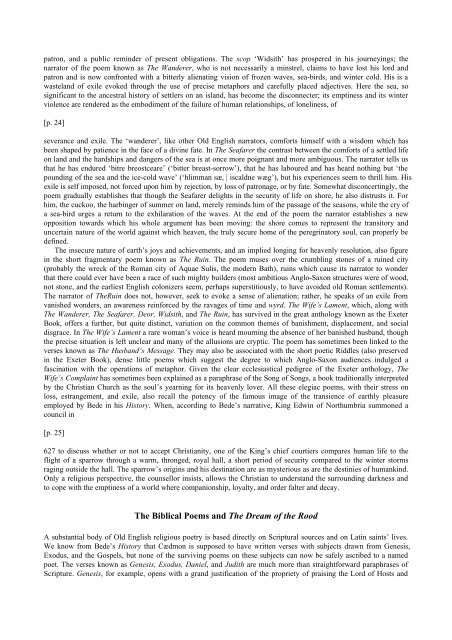THE SHORT OXFORD HISTORY OF ENGLISH LITERATURE
THE SHORT OXFORD HISTORY OF ENGLISH LITERATURE
THE SHORT OXFORD HISTORY OF ENGLISH LITERATURE
You also want an ePaper? Increase the reach of your titles
YUMPU automatically turns print PDFs into web optimized ePapers that Google loves.
patron, and a public reminder of present obligations. The scop ‘Widsith’ has prospered in his journeyings; the<br />
narrator of the poem known as The Wanderer, who is not necessarily a minstrel, claims to have lost his lord and<br />
patron and is now confronted with a bitterly alienating vision of frozen waves, sea-birds, and winter cold. His is a<br />
wasteland of exile evoked through the use of precise metaphors and carefully placed adjectives. Here the sea, so<br />
significant to the ancestral history of settlers on an island, has become the disconnecter; its emptiness and its winter<br />
violence are rendered as the embodiment of the failure of human relationships, of loneliness, of<br />
[p. 24]<br />
severance and exile. The ‘wanderer’, like other Old English narrators, comforts himself with a wisdom which has<br />
been shaped by patience in the face of a divine fate. In The Seafarer the contrast between the comforts of a settled life<br />
on land and the hardships and dangers of the sea is at once more poignant and more ambiguous. The narrator tells us<br />
that he has endured ‘bitre breostceare’ (‘bitter breast-sorrow’), that he has laboured and has heard nothing but ‘the<br />
pounding of the sea and the ice-cold wave’ (‘hlimman sæ, | iscaldne wæg’), but his experiences seem to thrill him. His<br />
exile is self imposed, not forced upon him by rejection, by loss of patronage, or by fate. Somewhat disconcertingly, the<br />
poem gradually establishes that though the Seafarer delights in the security of life on shore, he also distrusts it. For<br />
him, the cuckoo, the harbinger of summer on land, merely reminds him of the passage of the seasons, while the cry of<br />
a sea-bird urges a return to the exhilaration of the waves. At the end of the poem the narrator establishes a new<br />
opposition towards which his whole argument has been moving: the shore comes to represent the transitory and<br />
uncertain nature of the world against which heaven, the truly secure home of the peregrinatory soul, can properly be<br />
defined.<br />
The insecure nature of earth’s joys and achievements, and an implied longing for heavenly resolution, also figure<br />
in the short fragmentary poem known as The Ruin. The poem muses over the crumbling stones of a ruined city<br />
(probably the wreck of the Roman city of Aquae Sulis, the modern Bath), ruins which cause its narrator to wonder<br />
that there could ever have been a race of such mighty builders (most ambitious Anglo-Saxon structures were of wood,<br />
not stone, and the earliest English colonizers seem, perhaps superstitiously, to have avoided old Roman settlements).<br />
The narrator of TheRuin does not, however, seek to evoke a sense of alienation; rather, he speaks of an exile from<br />
vanished wonders, an awareness reinforced by the ravages of time and wyrd. The Wife’s Lament, which, along with<br />
The Wanderer, The Seafarer, Deor, Widsith, and The Ruin, has survived in the great anthology known as the Exeter<br />
Book, offers a further, but quite distinct, variation on the common themes of banishment, displacement, and social<br />
disgrace. In The Wife’s Lament a rare woman’s voice is heard mourning the absence of her banished husband, though<br />
the precise situation is left unclear and many of the allusions are cryptic. The poem has sometimes been linked to the<br />
verses known as The Husband’s Message. They may also be associated with the short poetic Riddles (also preserved<br />
in the Exeter Book), dense little poems which suggest the degree to which Anglo-Saxon audiences indulged a<br />
fascination with the operations of metaphor. Given the clear ecclesiastical pedigree of the Exeter anthology, The<br />
Wife’s Complaint has sometimes been explained as a paraphrase of the Song of Songs, a book traditionally interpreted<br />
by the Christian Church as the soul’s yearning for its heavenly lover. All these elegiac poems, with their stress on<br />
loss, estrangement, and exile, also recall the potency of the famous image of the transience of earthly pleasure<br />
employed by Bede in his History. When, according to Bede’s narrative, King Edwin of Northumbria summoned a<br />
council in<br />
[p. 25]<br />
627 to discuss whether or not to accept Christianity, one of the King’s chief courtiers compares human life to the<br />
flight of a sparrow through a warm, thronged, royal hall, a short period of security compared to the winter storms<br />
raging outside the hall. The sparrow’s origins and his destination are as mysterious as are the destinies of humankind.<br />
Only a religious perspective, the counsellor insists, allows the Christian to understand the surrounding darkness and<br />
to cope with the emptiness of a world where companionship, loyalty, and order falter and decay.<br />
The Biblical Poems and The Dream of the Rood<br />
A substantial body of Old English religious poetry is based directly on Scriptural sources and on Latin saints’ lives.<br />
We know from Bede’s History that Cædmon is supposed to have written verses with subjects drawn from Genesis,<br />
Exodus, and the Gospels, but none of the surviving poems on these subjects can now be safely ascribed to a named<br />
poet. The verses known as Genesis, Exodus, Daniel, and Judith are much more than straightforward paraphrases of<br />
Scripture. Genesis, for example, opens with a grand justification of the propriety of praising the Lord of Hosts and









